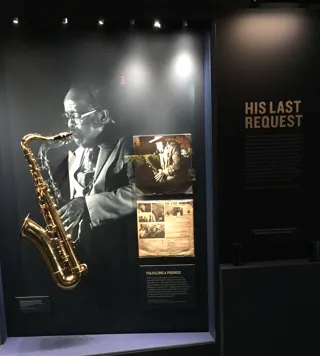Musician Ben Branch was at the Lorraine Motel in Memphis on April 4, 1968. He had returned to his hometown at the behest of the Southern Christian Leadership Council (SCLC) and Dr. Martin Luther King to participate and play at an upcoming rally. In an interview for the Library of Congress oral history project, Branch recollected his last conversation with the reverend. King had asked Branch to play “Precious Lord, Take My Hand” at a rally later that day, as Branch’s instrumental rendition of this gospel song was one of MLK’s favorites. “Play that song tonight – I want you to play it like you’ve never played it before in your life,” Branch remembered the civil rights leader saying. Just minutes after this conversation, an assassin’s bullet would take Dr. King’s life on the balcony of the Lorraine Motel.

Although Branch is often remembered for being one of the last people with whom Dr. King spoke shortly before his death, many are not aware that Branch was a committed civil rights activist and ally of King. Moreover, Branch was also a noted saxophonist long before his introduction to the movement. As a blues performer, he recorded and played with B.B. King’s orchestra and gained prominence in Memphis’s blues scene. In 1959, Branch had an opportunity to hear Dr. King speak at a Baptist church and was inspired. From then on, he began working for Reverend King and the civil rights struggle. During the 1960s, Branch moved to Chicago and became the musical director of the SCLC’s Operation Breadbasket Orchestra. In this capacity, he was often asked by Dr. King and the SCLC to play at rallies and events. As he linked his music with his activism, Branch began to be called the “Pied Piper” of the civil rights movement.
This February, I visited Vivian Branch, Ben Branch’s widow, in her Memphis home. In 2017, Mrs. Branch donated her husband’s saxophone to the National Civil Rights Museum, allowing the museum to create a new Ben Branch exhibit where visitors will have the opportunity to view the saxophone and listen to Branch’s rendition of “Precious Lord.” During our visit, Mrs. Branch shared photos and anecdotes about her late husband. Mrs. Branch also very graciously gave the museum several photographs of her husband, including this one of Ben Branch and his orchestra taken in the early 1950s at Clifford Curry’s Club Tropicana. Located on 1331 Thomas Street in North Memphis, Club Tropicana was a popular night spot since before World War II.Branch was the leader of the club’s house band, the Largos. In the image, a young Ben Branch is on the left, playing the tenor saxophone. He is joined on the stage by his brother Thomas Branch, playing the trumpet as well as other local musicians. The photo gives a wonderful sense of Branch’s early career at a historic African-American club. This professional gig would mark the beginning of Ben Branch’s long career in Memphis and beyond.

We are indebted to Vivian Branch for her contribution to the National Civil Rights Museum and look forward to unveiling the Ben Branch saxophone to the public in April. If you have an item that could help us tell the story of music and the civil rights movement, please contact me, Raka Nandi, at rnandi@civilrightsmuseum.org.